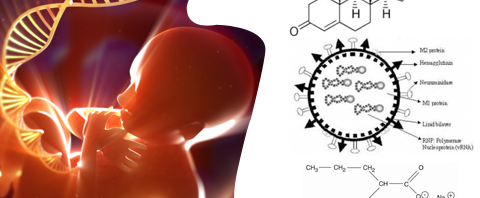The embryonic and fetal stages of development are perhaps the most important time periods in your entire life, at least in terms of healthy development. Exposure to a number of toxins, diseases, and even some medications during this time period can have detrimental effects on an individual, and cause permanent physical and cognitive defects.

One such disorder is Autism.
Autism Spectrum Disorder (ASD) has been associated with a variety of environmental risk factors can be encountered during pregnancy, including prenatal infections, toxins, teratogens (substances that specifically harm a developing fetus), zinc deficiency, and health problems in the mother (1). While there is evidence these risk factors increase a fetus’s risk of developing autism, it is important to understand that autism has a strong genetic component as well; the development of autism cannot occur through exposure to toxins and other environmental risk factors alone (1).
That being said, here is a list of substances and other risk factors that are believed to contribute to the onset of Autism. This list of risk factors was gathered from a literature review that can be accessed via the following link: https://moodle.cord.edu/pluginfile.php/625310/mod_resource/content/1/autism%20and%20environ.pdf
Toxins associated with the development of autism:
- Valproic acid-a teratogen linked with life-long deficits in social behavior (1).
- Thalidomide- another teratogen that also causes phocomelia, which is a congenital deformation of the arms or legs (1). The effect that thalidomide has on a developing fetus depends on when exposure occurs.
- Organic phosphate pesticides such as diazinon (1).
- Some psychiatric drugs (1).
- Heavy metals such as mercury and lead (1).
Some health problems of the mother are also linked to autism:
- Maternal diabetes (1).
- Maternal obesity (1).
- Maternal stress, which is thought to negatively impact the fetus’s immune system (1).
- Older mothers are also much more likely to have children with autism (1).
Some viral and bacterial infections can also raise a fetus’s risk of developing autism. These diseases increase the level of cytokines, which are signaling proteins involved in the immune response (1). High levels of cytokines can result with inflammation in the brain of the fetus, which can disrupt the activity of some types of neurons (2). Abnormally high levels of cytokines are also associated with high levels of glutamate in the brain, and too much glutamate is another risk factor for autism (2). The following diseases are linked with the development of autism:
- Influenza (1).
- Rubella (1).
- Cytomegalovirus (1).

Zinc deficiencies are also thought to play a role in the development of autism. Abnormally low levels of zinc during the prenatal time period can result with permanent damage to the central nervous system (1). Zinc deficiency can also play a role in disrupting the prenatal immune system, making zinc a double whammy risk factor for the development of autism (1).
While it’s important to keep these risk factors in mind, especially if you’re a pregnant woman, it’s also paramount to understand that exposure to only one of these risk factors is unlikely to result with the development of autism. It’s also extremely important to understand that genetics play a huge role in autism, and that mothers of autistic children should not be blamed for their child’s disability.
Sources:
- https://moodle.cord.edu/pluginfile.php/625310/mod_resource/content/1/autism%20and%20environ.pdf
- https://www.ncbi.nlm.nih.gov/pmc/articles/PMC5360854/
Image Credits:
- http://readingroom.mindspec.org/wp-content/uploads/2011/08/Gene-eviroment.png
- https://image.slidesharecdn.com/boydpptch3f-2-140811134820-phpapp01/95/bee-boyd-lifespan-development-chapter-3-30-638.jpg?cb=1407764974
- https://www.kidrisk.org/mainFrame/MRinfo.html
